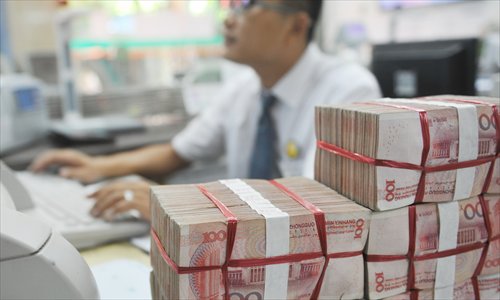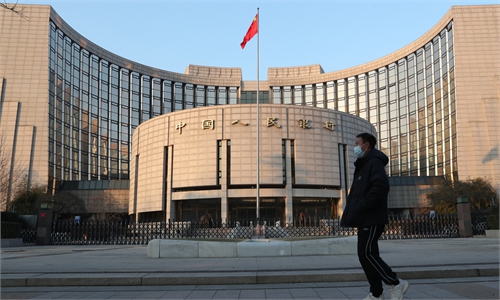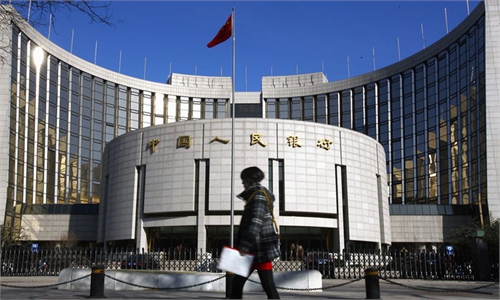
A bank staff member handles yuan transaction in Qionghai, South China's Hainan Province. Photo: CFP
China's new yuan loans came in at 2.81 trillion yuan ($418.89 billion) in June, beating previous market estimates, central bank data showed on Monday, as a flurry of pro-growth measures were rolled out to anchor the economy toward a brisk turnaround.
Last month's yuan loan addition rose by 686.7 billion yuan compared with the reading a year ago. In the first half of the year, yuan loans added 13.68 trillion yuan, showed figures from the People's Bank of China (PBC), the country's central bank. The June number increased from new yuan loans of 1.89 trillion yuan in May.
By the end of June, the M2 broad money supply grew 11.4 percent year-on-year, quickening by 0.3 percentage points from the end of last month or by 2.8 percentage points from the year before.
Furthermore, newly added total social financing for June rose to 5.17 trillion yuan from 2.79 trillion yuan in May, PBC data showed.
A research report by China Merchants Securities earlier in July put June's new yuan loans at 2.5 trillion yuan. Total social financing was estimated to tally 4.5 trillion yuan last month, while the M2 broad money growth booked 11.2 percent year-on-year.
Monday's data indicate a conspicuous better-than-expected month for credit extension as an imperative push for policy implementation in the wake of lackluster economic activity during April is shown to have effectively rebooted the economy.
The availability of a slew of supportive policy measures evidently gives a boost to credit and social financing growth, Wang Yunjin, a senior research fellow with Zhixin Investment Research Institute, told the Global Times on Monday.
Market liquidity was relatively ample in the second quarter, in support of rollovers of loans to small- and medium-sized businesses and residential mortgage loans, Wang said.
The analyst also cited a newly added national financing guarantee fund of 1 trillion yuan, an 800 billion yuan line of credit from policy banks, among various options in the country's policy reserve that have been introduced to stabilize the economy.
Since late April, the government has unveiled wide-ranging measures, including a push to revitalize existing infrastructure assets and expand effective infrastructure investment, and ramped-up incentives tailored to boost car purchases.
The continuation of policy rollouts at central and local governments as well as a renewed call for effective policy implementation was seen as enabling a swift economic rebound.
The economy posted an apparent pickup in activity over May. The uptrend was consolidated in June. The official manufacturing Purchasing Managers' Index (PMI) released by the National Bureau of Statistics (NBS) rose to 50.2 in June from 49.6 in May, a sign of expansion.
The official manufacturing PMI had stayed in the contraction territory for three months in a row.
As many regions phased out strict anti-epidemic restrictions, consumption, notably in the auto sector, saw improvement, Wang said.
June's residential credit recovered to levels on par with the same period of last year, while loans to the business sector expanded by 2.2 trillion yuan during the month, the analyst said, adding that medium- to long-term lending saw an increase of 1.45 trillion yuan, possibly buoyed by a rebound in investment confidence and the kick-off of major infrastructure projects.
Looking ahead, the country's credit extension is anticipated to continue upward despite signs of rising consumer inflation.
The country's consumer price index, a main gauge of inflation, edged up to 2.5 percent year-on-year in June from 2.1 percent in May, NBS data showed.
Total social financing credit growth is expected to rebound further in the next several months before moderating at the end of the year, UBS economists led by Wang Tao said in a note sent to the Global Times.
In addition to expectations for an accelerated disbursement of the already announced tax rebates and increased targeted fiscal support for regions and business sectors hard-hit by the Omicron outbreak among other fiscal easing measures, the economists forecast that the PBC may continue to boost credit growth via reserve requirement cuts and liquidity injection tools.
The PBC cut reserve requirements by a universal 25 basis points starting late April, aiming to release about 530 billion yuan in long-term capital.



